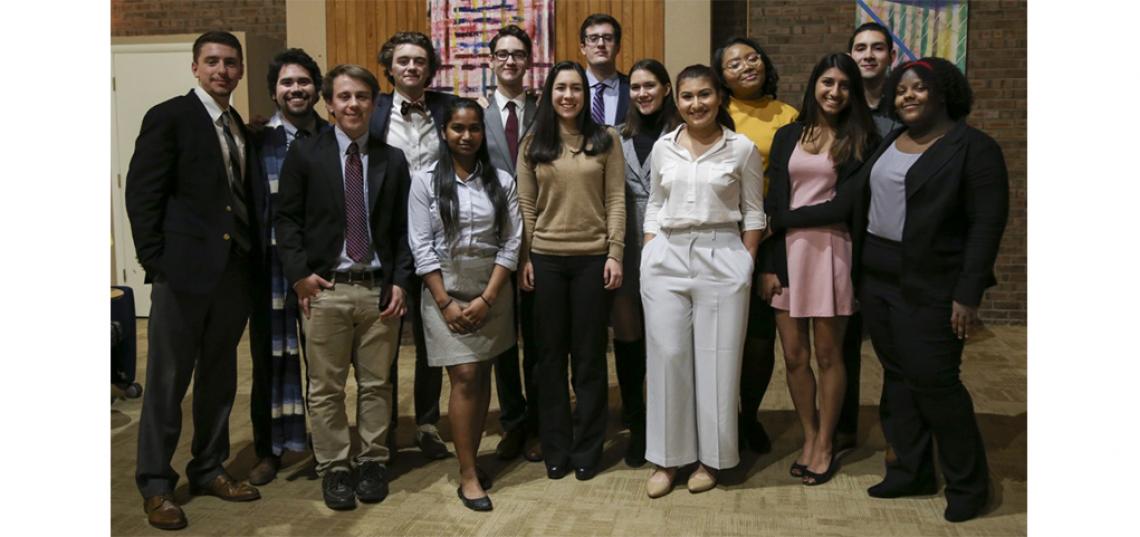
For a century and a half, every Rutgers student, faculty and staff member has encountered and most likely read copies of The Daily Targum on their commutes to class or work each day, but have they ever thought about who is behind this renowned college publication?
According to their website, The Daily Targum has more than once received honors such as the Columbia Scholastic Press Association's Gold Crown Award and the Associated College Press's Best In Show award.
For 150 years of production, making it one of the oldest college papers in the country, the Targum’s success has stemmed directly from the hard work and dedication of the Rutgers students who produce it daily.
On its website, the Targum describes itself as, “a student-written, student-managed, non-profit, incorporated newspaper.” It lives up to this description with an editorial board and teams of writers and photographers stocked with Rutgers students, many of these students majoring at the School of Communication and Information (SC&I).
To learn more about The Daily Targum, SC&I spoke with three SC&I students on the editorial board.
These students include: Managing Editor Saige Francis, Editor-in-Chief Khaula Saad and News Editor Christian Zapata. All Journalism and Media Studies majors at SC&I, they explain how majoring in journalism is connected to the work they do for the Targum, the value the paper brings to campus life, and some of the challenges involved in juggling their workload.
What inspired your desire to write news/ pursue journalism?
Saad: I came to Rutgers only knowing that I wanted to write and edit. The Targum showed me that I could do both and make a real career out of it, and that’s how I found my way into journalism.
Zapata: During my first year at Rutgers, I felt pretty lost, I didn't know what to do with my education. I had to be honest with myself about what I wanted from life and how my interests would work towards a greater good. One day I was scrolling through the University's listed majors and I found journalism, the rest is history.
What are the greatest challenges and rewards of writing news?
Zapata: Working at the office doesn't always give me the opportunity to take in-person interviews, but when I do I really enjoy speaking with people who are passionate about their work. The difficulty comes with meeting deadlines and working around writer's block.
In your opinion, why is student journalism important?
Saad: Student journalism is important because it allows other students to learn news through people who have the same interests as themselves. People who are older and in charge may not ever truly understand the feelings and needs of the student body, but another fellow student can. And by having students report the news, it not only lets understanding students deliver the news but it also prepares them for a future in a career they might want.
Zapata: It's easy for students to get lost in the college experience, student journalism makes it simple for them to keep themselves in the loop on what's going on at Rutgers.
What is your favorite article you have ever written for the Targum?
Zapata: I really enjoyed writing about Rutgers Students with Children. I spoke with the organization's president, she was very eloquent and had a lot of interesting things to say that I wouldn't have thought of otherwise. It made a really nice story.
Which was your favorite class in SC&I and why?
Zapata: Intro to Media with Steve Miller. I wouldn't picture myself caring much about the history of telecommunications but his energy made the class really interesting. It's crazy to think how far we've come since the days of radio communication.
Who was or is your favorite professor in SC&I and why?
Francis: I have taken two classes with Susan Keith and have really enjoyed the way she teaches, she has a hands-on approach while teaching. I felt like I learned a lot of applicable information and got great constructive criticism that will better me as a writer and editor.
Saad: I took Writing for Media with Michael Fitzpatrick and was immediately taken aback with how passionate he was about delivering important information and also ensuring that students learned as much as they could. The class was not about the grade, it was about learning and improving your writing. He would take extra time to edit everyone’s work in-depth and that type of individual care for students is one that has inspired me to this day.
Zapata: Steve Miller, he's a very enthusiastic individual and it shows in the way he runs his classroom.
How do you use skills developed from your SC&I education when performing on the editorial board for the Targum?
Francis: After taking over 10 classes within the journalism major, I understand what separates a mediocre article to an amazing one. Whether it’s making our ledes more active and engaging or knowing when we need more sources to make a story more well-rounded, my SC&I education has taught me how to produce the best articles.
Zapata: Making sure to contact reliable sources and remain as unbiased as possible is emphasized throughout my classes, I do my best to incorporate those values into the Newsdesk.
If you are interested in getting involved with The Daily Targum, visit their website.
Photo Credit: Dimitri Rodriguez
